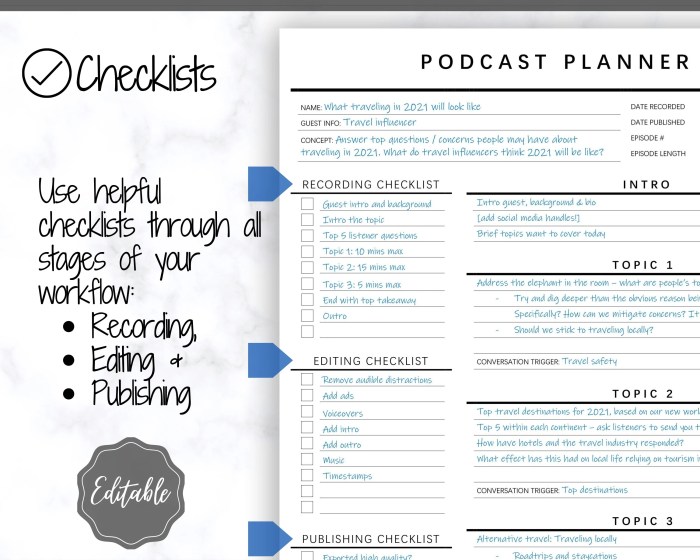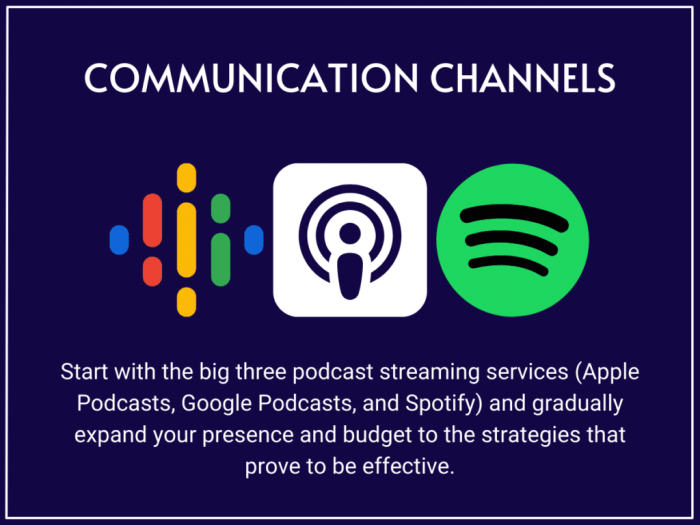Developing a Podcast Content Plan sets the stage for this enthralling narrative, offering readers a glimpse into a story that is rich in detail with American high school hip style and brimming with originality from the outset.
Embark on a journey where understanding your audience, defining goals, choosing relevant topics, structuring episodes, collaborating with guests, and promoting content are all essential elements in creating a successful podcast.
Understanding Your Audience
When it comes to creating a killer podcast content plan, understanding your audience is key. You gotta know who you’re talking to, what they like, and how to keep them coming back for more.
Researching Your Audience, Developing a Podcast Content Plan
Researching your audience is crucial to creating content that resonates with them. You can gather demographic information like age, gender, location, and interests through surveys, social media insights, or analytics tools. This data helps you tailor your content to fit their preferences and needs.
Analyzing Audience Preferences
Once you’ve collected data on your audience, it’s time to analyze it. Look for patterns in what topics they engage with the most, when they tune in, and how they prefer to consume content. This info can guide your content strategy and help you create episodes that cater to their interests.
Incorporating Audience Feedback
Don’t forget to listen to what your audience has to say! Whether it’s through comments, reviews, or direct messages, audience feedback is a goldmine of ideas for future episodes. Pay attention to their suggestions, criticisms, and preferences to continually improve your content and keep them hooked.
Defining Your Podcast Goals

Setting clear goals for your podcast is essential for its success. Goals provide direction, purpose, and a roadmap for your content plan. They help you stay focused, measure progress, and make strategic decisions to engage your audience effectively.
Examples of Specific Podcast Goals
- Increasing listener engagement by 20% within the next six months.
- Collaborating with three industry experts for guest interviews in the upcoming season.
- Launching a listener feedback segment to improve content relevance and quality.
Aligning Content with Goals
By aligning your content with your podcast goals, you ensure that every episode serves a specific purpose and contributes to achieving your objectives. For example, if your goal is to increase listener engagement, you can plan interactive segments, Q&A sessions, or audience polls to keep your audience involved and interested. This alignment helps maintain audience engagement by delivering content that resonates with their interests and needs.
Choosing Relevant Topics

When it comes to developing a successful podcast content plan, selecting topics that resonate with your audience is crucial. Your listeners are the driving force behind your podcast’s popularity, so catering to their interests is key.
Strategies for Brainstorming and Selecting Engaging Podcast Topics
- Conduct audience research to understand what topics they are interested in.
- Keep an eye on industry trends and current events for inspiration.
- Brainstorm with your team or fellow podcasters to generate fresh ideas.
- Consider feedback from your listeners and incorporate their suggestions.
Balancing Evergreen Content with Trending Topics
It’s essential to strike a balance between evergreen content, which remains relevant over time, and trending topics, which capitalize on current interest. Evergreen content ensures that your podcast remains valuable to new listeners, while trending topics can attract a wider audience.
- Plan a mix of evergreen and trending topics to keep your content fresh and engaging.
- Schedule evergreen episodes to provide a solid foundation for your podcast.
- Stay updated on current trends and incorporate them into your content plan strategically.
- Use trending topics to attract new listeners and capitalize on existing audience interest.
Structuring Episodes: Developing A Podcast Content Plan
When it comes to structuring episodes for your podcast, you have to consider different formats that can impact audience engagement, as well as tips for organizing content within episodes for coherence and flow. It’s also important to create episode scripts for effective delivery.
Different Episode Formats
There are various episode formats you can choose from, such as:
- Interviews: Bringing in guests to share their expertise or stories can add variety and depth to your episodes.
- Solo Episodes: Sharing your own thoughts, experiences, and knowledge can help build a personal connection with your audience.
- Roundtable Discussions: Having multiple hosts or guests discussing a topic can provide different perspectives and lively conversations.
Organizing Content within Episodes
It’s crucial to organize your content within episodes to ensure coherence and flow. Here are some tips:
- Start with a hook to grab the audience’s attention and introduce the topic.
- Break down the main content into segments or sections for better clarity.
- Use transitions to smoothly move from one point to another and maintain engagement.
- Include call-to-actions to encourage audience interaction or feedback.
Creating Episode Scripts
Scripting your episodes can help you deliver your content effectively and efficiently. Here’s why it’s important:
- Ensures you cover all key points and stay on track during recording.
- Helps maintain a consistent tone and style throughout the episode.
- Reduces the chances of rambling or going off-topic, keeping the episode focused.
- Allows for better time management and pacing of the episode.
Guest Collaborations
Inviting guests to feature on your podcast can bring a whole new dynamic to your content. Not only does it provide fresh perspectives and insights, but it also helps in expanding your audience reach through the networks of your guests.
Benefits of Guest Collaborations
- Brings diversity to the content by introducing different viewpoints and experiences.
- Enhances credibility and expertise by featuring industry professionals or influencers.
- Increases audience engagement as listeners are likely to tune in for special guest appearances.
Finding and Approaching Potential Guests
Networking is key when it comes to finding potential guests for collaborations. Attend industry events, connect with professionals on social media, and reach out to individuals who align with your podcast topics.
Bringing Expertise to Your Content Plan
- Guest appearances allow you to tap into the knowledge and expertise of industry experts, adding value to your episodes.
- Collaborating with guests can open up opportunities for future partnerships, cross-promotions, and collaborations.
- By featuring a diverse range of guests, you can cater to a wider audience demographic and keep your content fresh and engaging.
Content Promotion
Promotion plays a crucial role in expanding the reach of your podcast and attracting a wider audience. It involves spreading the word about your episodes through various channels to increase visibility and engagement.
Strategies for Promoting Podcast Episodes
- Utilize social media platforms: Share teaser clips, quotes, or behind-the-scenes content on platforms like Instagram, Twitter, and Facebook to generate interest and drive traffic to your episodes.
- Email marketing: Build an email list of subscribers and send out newsletters with episode highlights, guest features, and upcoming topics to keep your audience informed and engaged.
- Collaborate with other podcasters: Partnering with other podcasters in your niche for cross-promotion can introduce your show to a new audience and help you gain credibility in the podcasting community.
- optimization: Use relevant s, tags, and descriptions in your podcast titles and episode descriptions to improve search engine visibility and attract organic traffic.
Importance of Consistency in Content Promotion
Consistency in promoting your podcast content is key to sustained growth and audience retention. By regularly sharing new episodes, engaging with your audience, and maintaining a cohesive branding strategy across all promotional channels, you can build a loyal following and establish your podcast as a reputable source of valuable content.
